.
.
After my uncompromising critique of an episode of TV’s The Nation, broadcast on 24 May, I was gratified and relieved that the producers and hosts of the programme had returned to a degree of journalistic/media professionalism that we should expect as the norm for current affairs in this country (and which is too often lacking).
The Nation, broadcast on 14 June, was good, solid, current affairs which left the viewer better informed after watching it. Hosts Lisa Owen and Patrick Gower, and reporter Torben Akel, were on form with their respective interviews.
.

.
.
First up; Hekia Parata, on what is rapidly devolving into another of National’s disastrous, ill-considered attempts to insert neo-liberal “reforms” into our education sector. National’s $359 million so-called “Teaching & leadership career pathways” has been roundly condemned by the primary school staff union, NZEI, and the Principals Federation asserting that it is unacceptable and unworkable.
Parata responded to questioning from Patrick Gower;
.
.
[FULL TRANSCRIPT: Hekia Parata]
A decidedly ‘robotic’ performance from an automaton-like Hekia Parata. (Have National Party strategists and contract scientists actually built a look-a-like android replacement replacement for Parata, to minimise potential stuff-ups from the mishap-prone education minister? And how did they make the android more realistic than the original?!)
Whether she actually convinced teachers and parents watching her performance is doubtful. When politicians avoid giving direct answers to questions, the inescapable conclusion is that they’re hiding something.
What is Parata hiding?
Perhaps the very real likelihood that the so-called “Teaching & leadership career pathways” policy is National attempt to introduce performance-pay-by-stealth?
In fact, my money is precisely on that call: performance-pay-by-stealth.
At any rate, she stayed on-message, and it was fairly obvious that Parata had been well-schooled by her tax-payer funded media-minders. She passed National’s Standard for evasiveness to questions.
.
Next up, a serious look at one of this country’s worst pressing social problems – child poverty. The Right can bleat on about “SkyTV aerials”; ill-informed moralists who lead ‘saintly lives’ can pass judgement on “poor parenting”, and the middle classes can turn a blind eye – but none of that will diminish a growing social crisis in our midst.
Prior to the introduction of neo-liberalism; the “free” market; de-regulation; and “more choices”, the term “child poverty” was unknown. Food banks barely existed, as this 2005 Child Poverty Action Group report pointed out;
There have always been foodbanks in Auckland, but until recently these were small- scale operations and, like the soup kitchens, were there to deal with emergencies and the requirements of the handful of indigents that have always been present in the urban areas of New Zealand. Data from the Presbyterian Support Services Foodlink Directory5 shows there were 16 foodbanks in Auckland in 1989. By 1994 this had mushroomed to over 130 (Mackay, 1995).
Nationally, the number of foodbanks exploded following the 1991 benefit cuts, and the passage of the Employment Contracts Act (ECA). For those in already low-paid and casual jobs, the ECA resulted in even lower wages (McLaughlin, 1998), a situation exacerbated by the high unemployment of the early 1990s (11% in 1991). The benefit cuts left many with debts, and little money to buy food (Downtown Community Ministry, 1999). In 1992 the introduction of market rents for state houses dealt another blow to state tenants on low incomes. By 1994 it was estimated that there were about 365 foodbanks nationally, one-fifth of which had been set up in the previous year (Downtown Community Ministry, 1999). This figure was an estimate, based on information from the 1994 foodbank conference. There were no nationally collated figures, a weakness that persists in the sector today.
Regarding what in some cases was a quadrupling of demand for food parcels after 1991, Mackay cautiously hypothesizes that “it is likely that much of it was driven by the benefit cuts of April 1991” (Mackay, 1995). Foodbank workers themselves were unequivocal that the 1991 benefit cuts were the key driver of increased foodbank use. Reflecting those most likely to be unemployed or on low wages, up to 90% of foodbank users were dependent upon some form of income support, and Maori and Pacific Island families were over- represented among those seeking assistance (Mackay, 1995).
Lisa Owen interviewed Jonathan Boston (Professor of Public Policy at Vic, co-chair of Child Poverty Expert Advisory Group), who has written New Zealand’s first book on Child Poverty in this country. That interview was followed up by Commissioner for Children, Dr Russell Wills.
.

.
[FULL TRANSCRIPT: Jonathan Boston & Russell Wills]
Both interviews made for compelling, informative viewing.
Dr Wills and Prof Boston are professionals; academics; with a deep understanding of problems and issues confronting our society. Neither men have a political agenda – theirs is simply to inform anyone who will listen that child poverty is a problem we can no longer afford to ignore.
Dr Wills made this simple statement in a level, calm tone – but which was nevertheless dramatic for it’s content;
“My weekend will be full of poor mostly Maori and Pacific preschool children with infectious diseases that our English registrars often haven’t even seen before. Now we see acute rheumatic fever. We see tuberculosis. We have admissions to intensive care with children with illnesses that should have been treated in primary care but they couldn’t afford to go. We just don’t see those kinds of issues in our elderly people and I think that’s a great shame.”
.
.
[FULL TRANSCRIPT: Colin Craig]
Gower started the interview with this bizarre exchange – almost reminiscent of a school Head Master dressing down an errant pupil;
Patrick Gower: I want to start with this extraordinary political cry for help that you made this week, effectively asking the Prime Minister to pull a candidate out of a seat for you.
Colin Craig: I didn’t do that.
Gower: Yes you did.
Craig: No, I didn’t.
I was expecting an impatient, testy, Gower to stand, pick up a nearby cane, and instruct Craig,
Craig, of course, supports beating children, so this scenario would not be entirely implausible. And no one would have blamed Gower in the least.
Gower: So which one of those could you beat? Which one of those three candidates could you beat? And tell the truth.
To which Craig responded;
Craig: Well look, I don’t think I could beat any of them unless we run a fantastic local campaign and people get behind us. Last time I –
Interesting.
Interesting because of what was not said, rather than what was. No outrage over “dirty deals” in this interview, as Mr Gower expressed recently regarding the Mana-Internet alliance;
.
.
And…
.
.
.
Postscript #1
The parameters “child poverty” nz on Google returns 178,000 results;
.
.
Not exactly something to be proud of, eh, New Zealand?
Postscript #2
It is has been said before and it is worth repeating again; the greatest disservice that TVNZ and TV3 programming managers have done to the viewing public; their own staff; and to their entire network is to ‘ghettoise’ “The Nation” and “Q+A” on early morning and late night time-slots in the weekends.
Maori TV schedules “Native Affairs” on Monday evenings at 8.30pm. This suggests that the management at Maori TV have sufficient faith in their ‘product’ that they are willing to give it a prime time viewing slot.
Sadly, the same cannot be said for TVNZ and TV3.
(And no, we will not settle for “Seven Sharp” or “The Paul Henry Show“.)
Postscript #3
National’s media release on it’s “Teaching & leadership career pathways” was published on it’s on party website; the Beehive website; and on Scoop Media. There’s a slight ‘risk’ in publishing an official party policy communique on an independent website – you never quite know what else is going to appear alongside the text;
.
.
.
.
.
I’m sure Parata, Key, et al in the National Party would be “delirious with joy” at having a political advert for Kim Dotcom’s Internet Party nested within their pride and joy educational policy statement release…
… Not!
.
References
Beehive: $359m for teaching & leadership career pathways
Radio NZ: NZEI, principals unite against policy
TV3 The Nation: Interview – Education Minister Hekia Parata
TV3 The Nation: Interview transcript – Education Minister Hekia Parata
Salvation Army: Hard to swallow – Child Poverty Action Group
BWB Books: Child Poverty in New Zealand
TV3 The Nation: Interview – Jonathan Boston & Russell Wills
Wikiquote: Margaret Thatcher
TV3 The Nation: Interview – Conservative Party leader Colin Craig
Twitter: Patrick Gower
TV3 The Nation: The new breed of career MPs
National Party: National Selects Todd Barclay For Clutha-Southland
National Party: $359m for teaching & leadership career pathways
Beehive: $359m for teaching & leadership career pathways
Scoop Media: $359m for teaching & leadership career pathways
Previous related blogposts
Review: TV3′s The Nation – “Let them eat ice cream!”
Patrick Gower – losing his rag and the plot
Doing ‘the business’ with John Key – Here’s How
Additional
Facebook: Inside Child Poverty
Bryan Bruce: How to vote strategically improves children’s lives
Events
Tuesday 17 June, 5.30pm
Panel discussion with Jonathan Boston,
Damon Salesa, Susan St John and Russell Wills. Chaired by Tracey McIntosh.
Fale Pasifika, University of Auckland
26 Wynyard St, Auckland
Thursday 19 June, 8.00am – 4.00pm
Inequality: Causes and Consequences
Student Union Memorial Lecture Theatre
Victoria University of Wellington
Friday 20 June, 5.30pm
Lecture and book launch
Speakers include: Justine Cornwall, Jonathan Boston, and Cathy Wylie
Royal Society of New Zealand
11 Turnbull St, Thorndon, Wellington
.
Above image acknowledgment: Francis Owen/Lurch Left Memes
.
.
= fs =



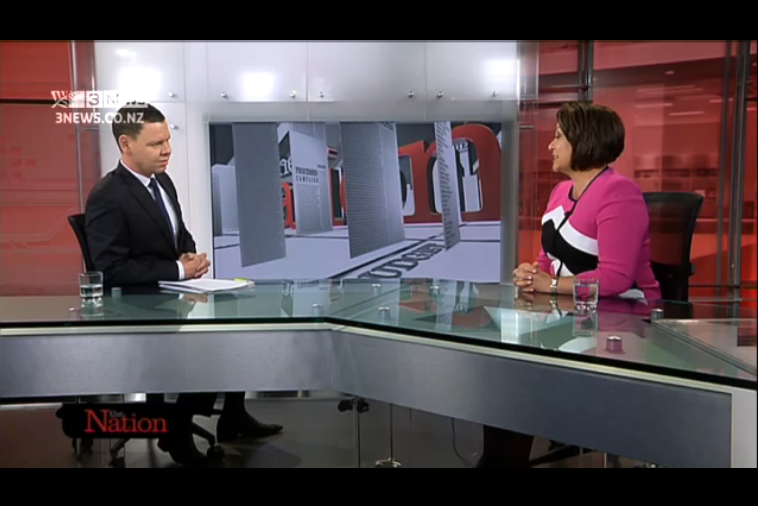
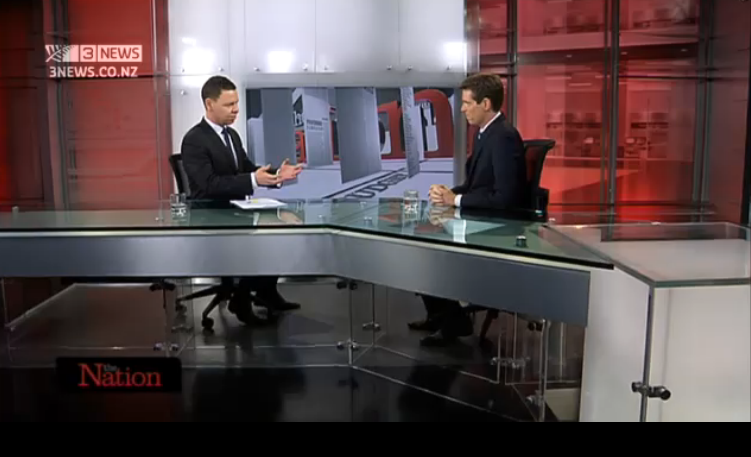
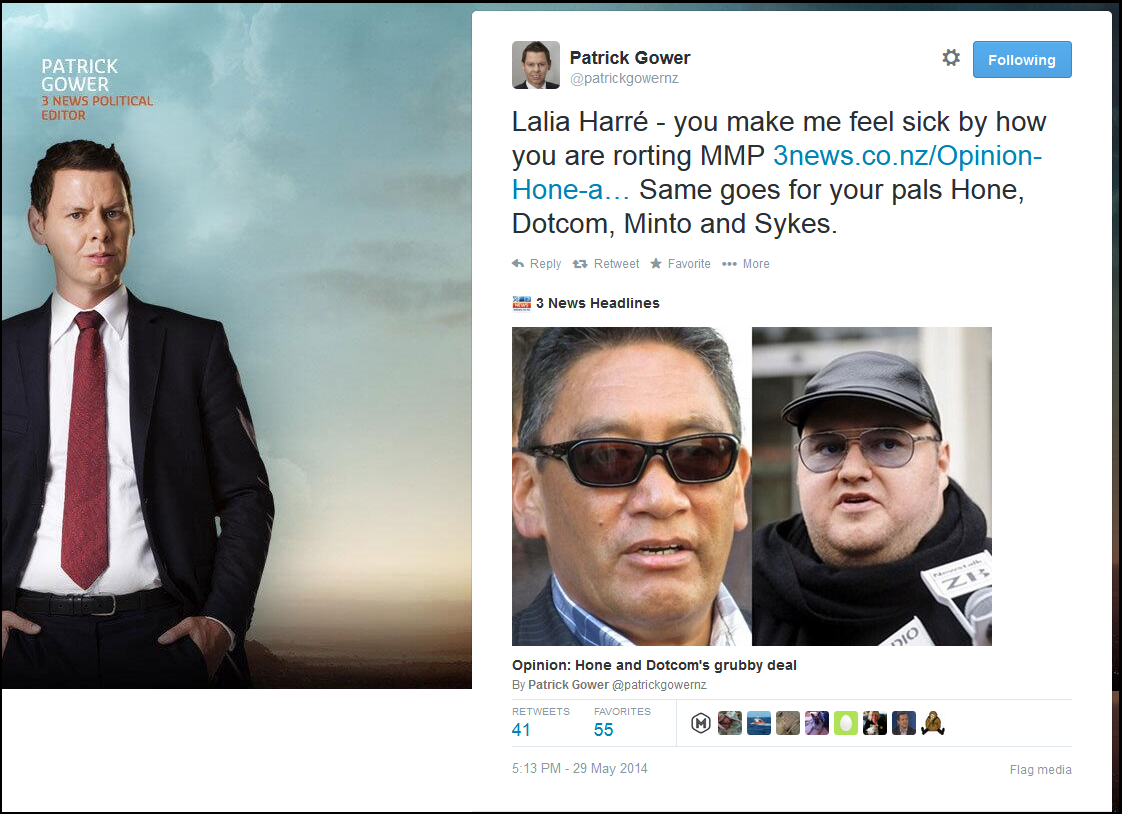
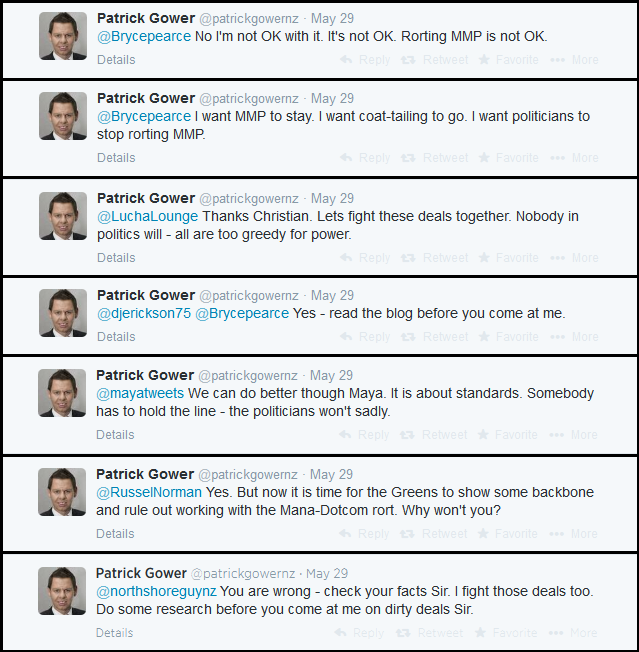
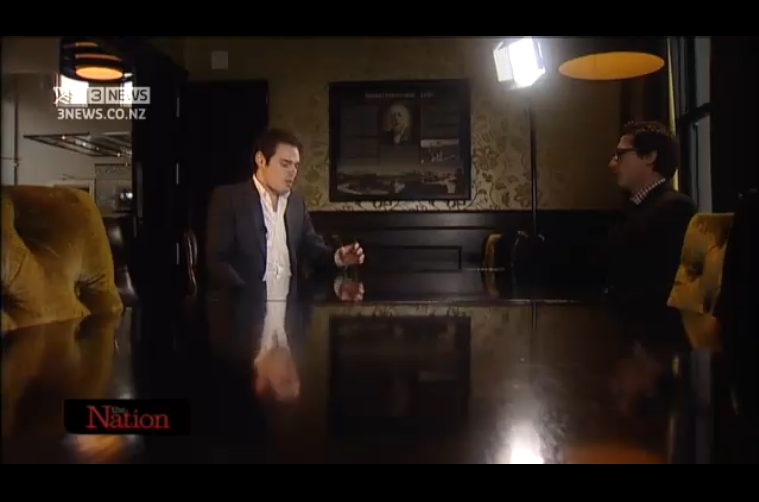

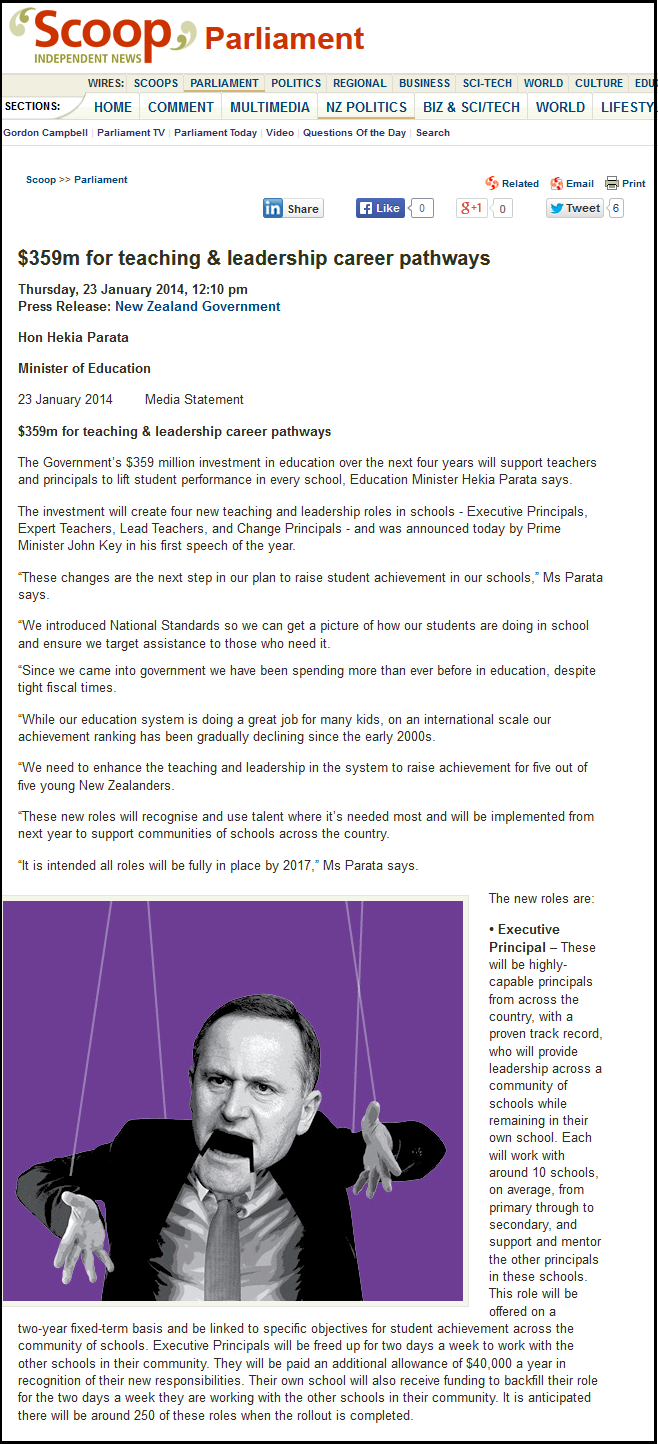
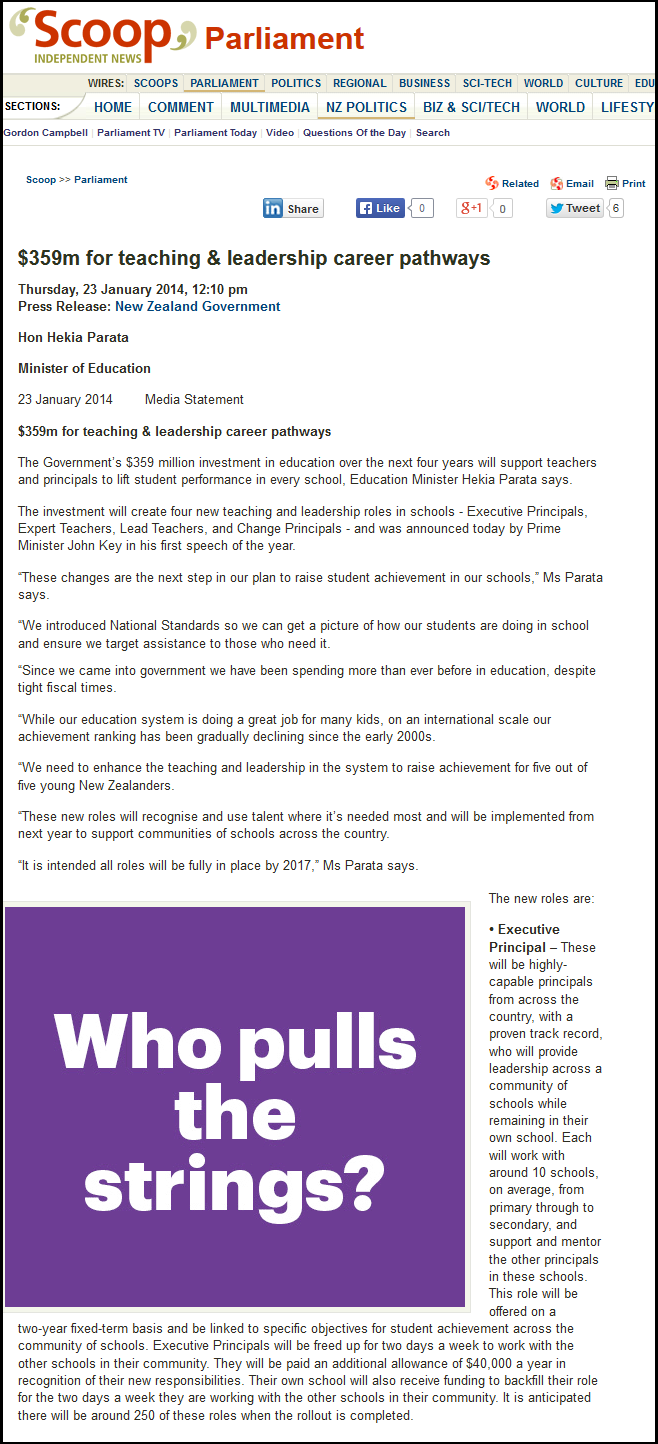
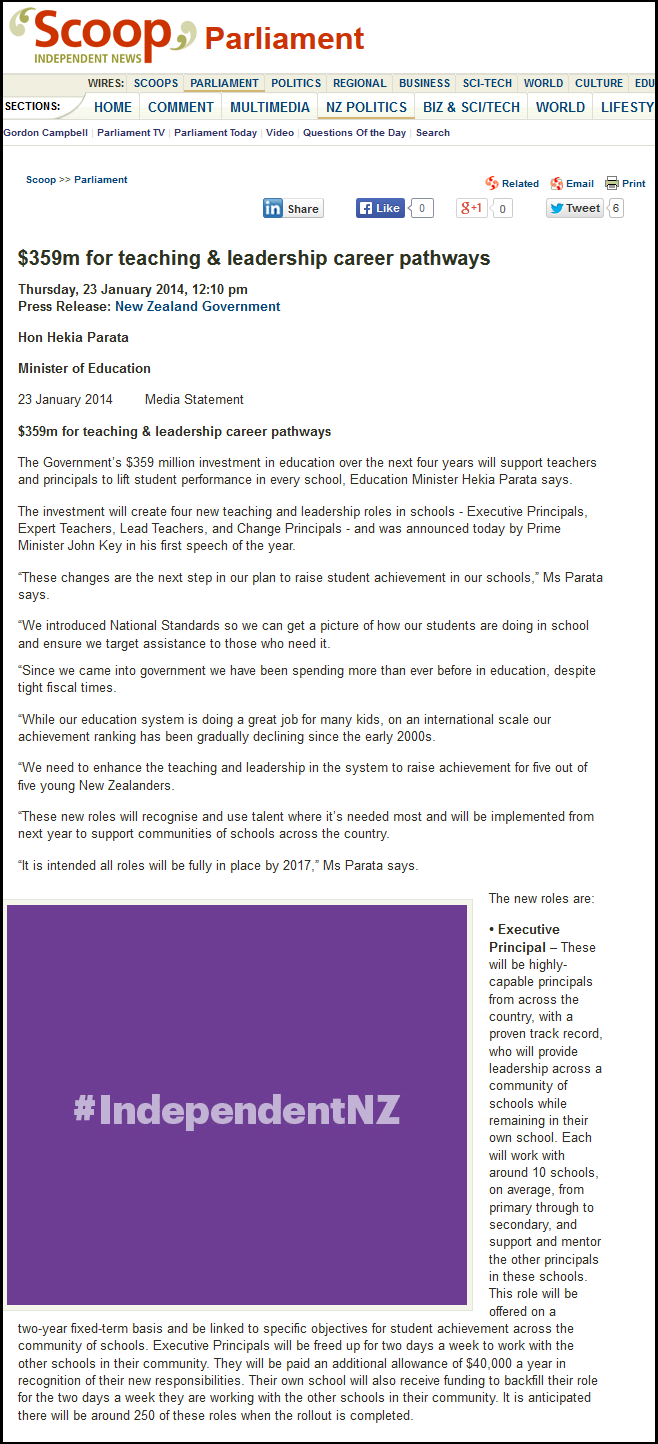
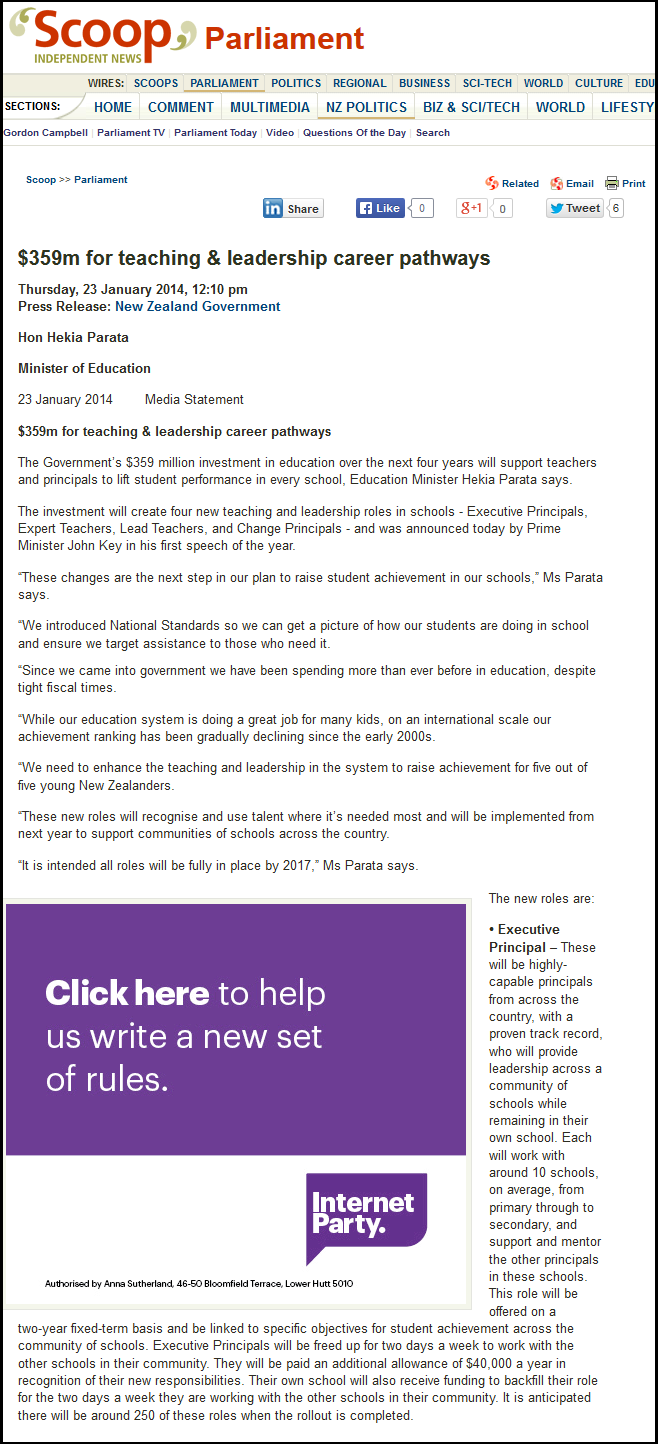





Ummmm. .. I don’t think it was a decision by the Government to post the press release on Scoop. That was the decision of the Scoop editorial team. The Government simply released a press release to all relevant media, which includes Scoop.
“But not the ‘norm’ for the Left because, to date, such deal-making has been rare.”
Rare? How many times did Labour gift Sydenham to Jim Anderton? Remember the deal between Labour and the Greens in Coromandel? What about the current deal between the Internet Party and Mana…the ultimate hypocrisy considering Harre’s public protestations against coat tailing.
The left are seriously hypocritical on this issue, and the wider public is having a big laugh at its expense.
What rot. Labour did not “gift” Sydenham to Anderton. In fact, they tried to destroy the Alliance at every turn. I should know, I was working with the Alliance. So as usual, you are full of it, IntrinsicRWNJ.
As for the Internet and Mana – so what? There have been many political alliances in the past, with the Alliance being the most famous.
No, what you are up to is finger pointing to try to deflect criticism. It’s what you tighty righties are notorious for. You just can’t stand the fact that, for once, the Left has good funding and good prospects. And that really sticks in your throats eh??
You just can’t stand up to your own hypocrisy.
Priss is correct. Labour did all they could to remove Anderton from Sydenham (later Wigram) and there was certainly no “deal” in evidence.
At the time I was connected with Rongotai Alliance, and it was fairly clear that Labour’s sole aim was to destroy the Alliance.
This was evidenced in 2002, when Labour finally destroyed the Alliance by not “gifting” Waitakere to Laila Harré, thereby pushing the Alliance out of Parliament.
As usual, Anonymous ACT Support Intrinsicvalue makes up any old sh*t to suit himself.
One man`s trash is another man`s treasure …… Well written Frank , National Party supporters will demonize and cudgel this spectacular article …..
@ Frank . While I must confess I have yet to read your seemingly detailed Post ( I’m cooking diner ) I see you have the attention of The Two True Blue Blow Flies Gasman and Intrinsicworthlessness espousing brain farts like ducks with diarrhoea .
Congratulations ! You must have hit a nerve . I therefore must read . Well done .
I agree that Lisa Owen was a bit unnecessarily aggressive with Dr Wills and Professor Boston. She was trying to push them towards simplistic answers and wanted them to say that we would need to cut Superannuation in return for ending child poverty. But I don’t think either of these men actually were trying to say that. They were considering tweaking super, perhaps, as one of a raft of ways to pay for child benefits; but were not parroting Labour’s idea of raising the age of entitlement. One of them did say perhaps we could raise it for those who didn’t need it, but keep it for those that did. I think this is a dangerous suggestion as who would be defining “need” and maybe that “need ” would be met by a government by keeping the person on some oppressive kind of benefit instead for a few years. I think this push to cut Superannuation is wrong. Prof Boston was actually saying that Superannuation was a success which has prevented poverty in the elderly. Why then spoil a good thing? I work with beneficiaries and pensioners, and many pensioners are actually only just getting by and would definitely be thrown into poverty if their super was cut. One thing I did like was Lisa’s insistence that the men were clear that all benefits need to be raised substantially. This is absolutely true, and about time it is being said. We should not have to swap one poor group-children- for another- the elderly. There is plenty of money in company and bank profits, high managerial salaries etc to be taxed to pay for the necessary welfare increases.
Well said Rapana!
Comments are closed.